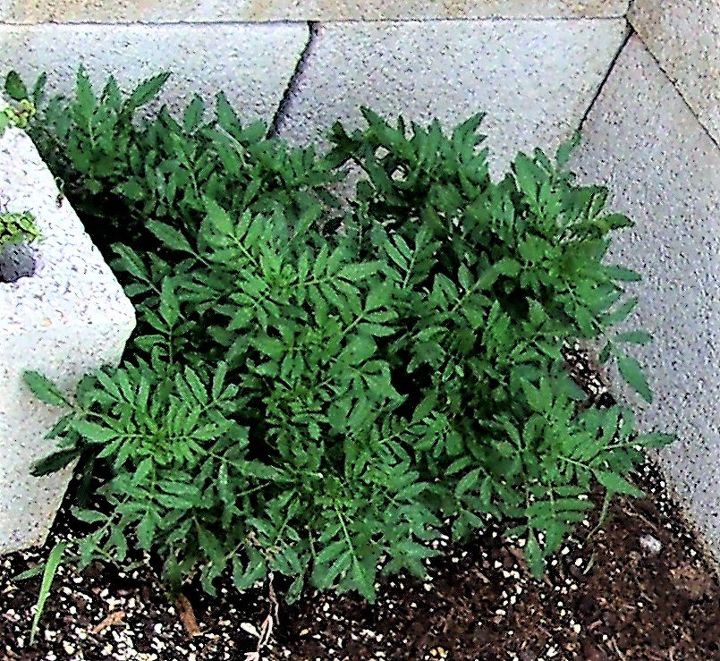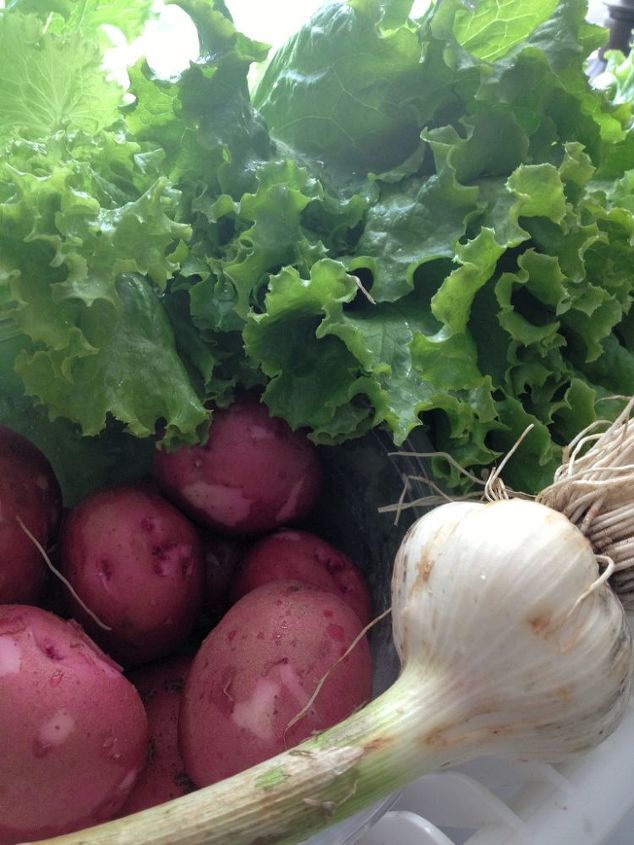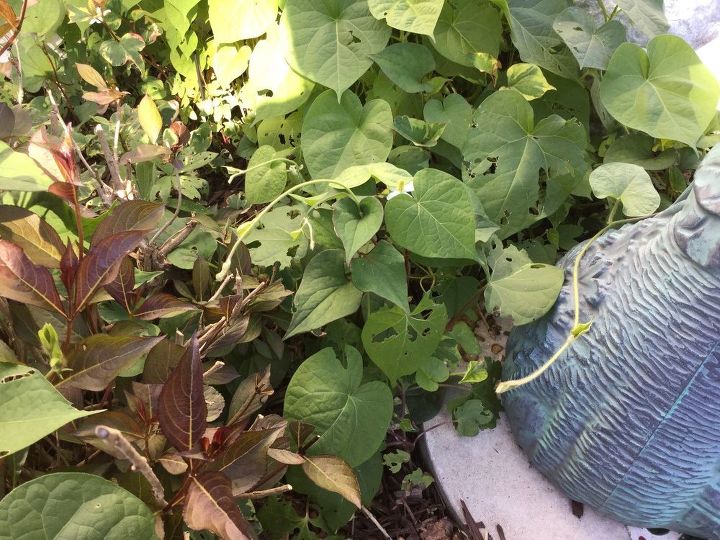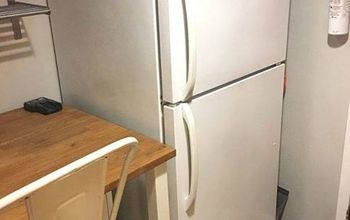What am I doing wrong with my tomatoes?
I have had a raised garden bed for 3 years. Each year everything does okay except my tomatoes. The leaves turn yellow and fall off without much produce. When I started 3 years ago I used a mixture of bagged compost and top soil. What am I doing wrong?
Related Discussions
GNATS - How to get rid of them?
Somehow my house and garden got tiny gnats that killed my fuchsia plant and fly everywhere. I have tried ALL the Web recommendations - soap and oil dishes, sand in th... See more
Marigolds growing! Should I pinch the buds?
My marigold plants are growing. I heard that pinching the buds until Autumn will allow them to grow without killing the plant. Is this true?
Growing garlic
Growing our first garlic, should we wait until the leaves are drying out before we pick it? Husband picked first one today along with our first potatoes.
How to keep mice out of your garden?
Hi everyone, I have mice in my garden destroying my vegetables and I have also noticed them in the barn and shed. Please can someone tell me how to prevent them from ... See more
What's the best flower/plant to grow in Texas?
I know that opinions vary, but what's your opinion?!I have great luck w Rosemary plants. Green all year long.
What do I feed my rhubarb to get thicker stems? Mine are mostly skinny
plants have some sun during the day-- if I plant more should they be in a sunny location ? Love strawberry rhubarb pie but I don't get a heavy harvest.




If you reside in an area of heavy rainfall, you've done nothing wrong. This has been a problem for the last few years. Rotate where your tomatoes are planted. Add a small amount of Epsom salts with the fertilizer when planting. Add more, halfway through the season. Make sure plants have adequate air circulation. Avoid over fertilizing, which gets you many leaves and few tomatoes. Pinch back "suckers" to direct growth to tomatoes.
If temps are over 85 degrees F, tomatoes tend to stop producing. Add a sun shade, if possible. Monitor for insects. Water at ground level, rather than overhead.
Try a different variety with more tolerance.
Hello Carol! I too grow tomatoes in two raised beds. Part of the problem could be that you should be rotating where you plant the tomatoes each year. If you don't rotate with another vegetable-like green beans-your tomatoes will have a much greater chance of getting blight. I also lay black garden fabric over my soil, stapling it to the wood edges of the raised bed so the soil can't splash up on the plants. I cut holes to plant each tomato plant. I add a few tablespoons of Epsom salt to the holes and mix it around in the dirt, then plant the tomatoes. I give each tomato plant plenty of space to grow so they aren't too crowded. You can mulch over the fabric once you get your plants in. As they grow I trim off the bottom leaves and pinch off the plant tips that won't produce tomatoes. I only water from the bottom of the tomato plants never over the top and I alternate watering with Miracle Grow Tomato Fertilizer and an Epsom salt water solution along with just plan water. Be careful not to over water. If we get a lot of rain I don't water much. My plants get a lot of heat and sun so make sure your beds are in the right place. I amend the soil every two years-adding more dirt and compost. I have removed the soil a few times from the beds and started with new. Here is some info: http://www.tomatodirt.com/pruning-tomato.html
WALNUT Tree root or leaves in mnulch can cause this to happen.
Not necessary to rotate beds ...I planted tomatoes in the same area for over 10 years..what I did rotate however was the variety of tomato...different varieties have different root systems...bet you didn't expect to hear that..some are deeper and some are not that deep.....prep the top 6" of soil with compost..mix in well..to each planting hole you then add DRY...a mixture of 1 tablespoon of Epsom Salts, and 1 tablespoon of powdered milk..lightly water in...toms are heavy calcium users..and this needs to be added...then plant as usual...after the plants have hardened off...either t your home or in the nursery.....if the green tops bolt on you due to wonderful weather and you are just too busy ... lay them on their side..root ball into the hole...the tall green shoot laying prone in a small trench....cover and leave 4 to 6 good leaves standing up straight ... in what will be a new hole...it's magic.. I don't like to do this for more than just a few plants..better to not buy unless you have all prep work done first...
I don't like to do this for more than just a few plants..better to not buy unless you have all prep work done first...
Yellow leaves can be from a lot of different isssues. Do a quick soil test, make sure with all the miracle gro and epsom salt, you haven’t made the soil too salty, the downside to over fertilizing. Too much fertilizer for the soil can make your plants sickly. Usually well amended compost should be all you need.
Don’t over or under water. Do the one inch a week rule. Water one inch deeply. If you use a sprinkler, any cans will do, tuna cans are usually suggested because they’re an inch high, just make sure it gets an inch for the entire bed. The soil should be damp down about 6-8”, even 10-12”. Keep a rain gauge out in the yard so you know if you need to water. Don’t let the soil dry out or get to wet. Don’t water for 15 minutes every day, it’s not enough and it stresses the plants out.
Soil likes to rest. It’s why crop rotation is important. It’s not about the depth of roots of different tomatoes or different plants as much as what does the soil have to offer the specific plant. Root depth is determined not only by type, but more importantly water and nutrients. They grow to where they get what the plant needs. Again why you need to get soil tested. Search crop rotation and follow the guides, it doesn’t have to be every year. If you see a specific vegetable (tomatoes) aren’t doing well, you need to plant something else there the next year.
The best back yard gardens I have ever had the privilege to see were raised beds in Southern California, back in the early ‘60’s and ‘’70’s. 200 miles apart. One used rabbit fertilizer and kitchen/yard compost. One used kitchen compost only. They also used fish heads and tails. Both gardeners were older, in their ‘70’s, one Italian, one Indonesian. Neither used a commercial fertilizer. Both had a rain catchment system and used soaker hoses or took garden hoses that folks would toss because the hose split or bubbled. They’d stick an ice pick numerous places down the hose, essentially creating a drip irrigation or soaker hose. Both had a bed that would lie dormant for a year and basically be the compost pile.
I’ve never had a problem using oak leaves in the garden. I also haven’t had a problem using English walnut leaves. The Black Walnuts leaves are discouraged from my garden. They are raked or blown back behind the tree in the woods. The acorns are problematic when the little buggers start sprouting, if they’re composted well, I don’t have a problem. I don’t turn my compost anymore.
Call your local agriculture agent. He has all the answers.